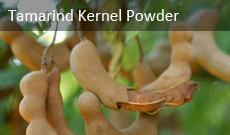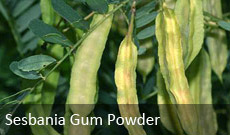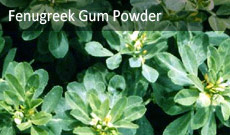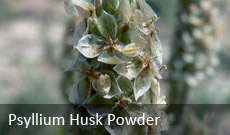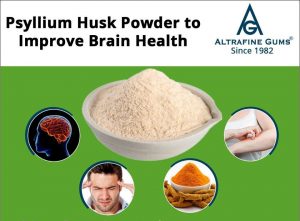Psyllium husk is derived from the seeds of the Plantago Ovata plant. The husk contains a large amount of soluble as well as insoluble natural fiber is used extensively in pharmaceutical, food, cosmetics, and varied industries. Traditionally it is used to treat heart diseases, bladder problems, hemorrhoids, high blood pressure, and urinary problems in many communities. It is known as bulk-forming, laxative, it easily absorbs water in the digestion tract to help stimulate digestion.
Properties of Psyllium Husk
The husk is a rich source of Protein, Vitamin B1, Glycosides, Choline, Polysaccharides. It can bind up the fats and bile juice which helps in waste excretion from the body. It is rich in fiber, a perfect way to feed yourself pure and natural fiber. Its mild laxative effect can easily regulate bowel movement and stimulate metabolism, also helps in weight loss.
Psyllium husk in brain Health
Psyllium husk powder helps think clearly by lessening the impact of Dementia. It helps to improve concentration by reducing fatigue and boosting energy levels to perform any activity. It can improve the cognitive functioning of the brain which aids in thinking, problem-solving, planning, judgment, and organizing. It is also effective in reducing the gluten adverse effect which may cause neurological diseases such as Parkinson’s disease, Alzheimer’s disease, and even Autism.
Health benefits of Psyllium Husk
Psyllium is gaining popularity throughout the world especially in health and natural environment based products conscious. This gluten-free substance is now used as a binding agent in bread manufacturing industries. It is also used as a binding agent and disintegrate in making compressed tablets. It can be used in the production of low carb confectionaries because of its natural gelling properties which can make sweets softer and enhance their natural color. Its glucoside and mucilage molecules are used in the food industry to form a gel to provide thickening texture to the food.
The consumption of husk creates bulkiness in the stomach leading to full sensation for longer and discouraging snacking, ultimately controlling the diet intake. It also helps in the prevention of colon cancer by maintaining an optimum level of pH in the intestine along with preventing microbes to produce cancerous substances. Swollen veins in the lowest part of rectum and anus lead to Hemorrhoids which makes bowel movement painful and in adverse case bleeding. it promotes pain-free defecation by absorbing the nourishment from the surroundings of the intestine. It can further reduce the serum total cholesterol and reduce the risk of coronary heart disease.
Composition of Psyllium husk
The husk fiber can be divided into three main components, the highly fermentable, the unfermentable, and the poorly fermentable & bulk-forming composing the highest percentage. The studies have proved the psyllium is rich in xylose, arabinose, uronic acid, galactose, glucose, rhamnose, mannose, and traces of ribose. The un-fermented part is responsible for effective gel formation and formation of fecal after psyllium supplementation. The studies even suggest consumption of psyllium husk on a daily basis is safe and promotes earlier termination of meals leading to reduced intake of fat.






